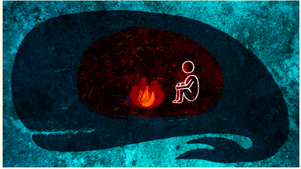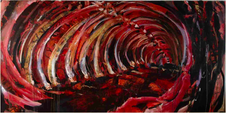Wouldn’t it be nice to change without changing, without effort and uncertainty? It’d be nice, but development usually derives from struggle; it does not come without effort, without having to deal with the unknown. Stories and fables have been created for millennia to teach us many important life lessons, like how to grow from struggle. Joseph Campbell (1972) put together many of those teachings into a comprehensive story line, he called the monomyth. This is the famous and, perhaps trite, Hero’s Journey. But many of us keep on coming back to the monomyth, because there’s so much to learn from it. The hero, whichever story we choose, is our role model. It is our encouragement to take a leap, to do something different, to exert change despite adversity.  I want to focus on the particular moment of the hero’s journey called “the belly of the whale”. The Belly of the Whale represents the moment where the hero, in his journey to a “region of supernatural wonder” (Campbell, 1972, p.30) must “instead of passing outward… goes inward, to be born again” (Campbell, 1972, p.91). In the stories Campbell talks about, the hero has left the comforts of home, and then there’s a crucial moment when he or she is swallowed by something larger than him or her: an elephant, a monster, a wolf, a whale. This period of time inside the “belly of the whale” represents the critical period of incubation of inner change, where the old dies and the new is born. Luke Skywalker goes to meet Yoda in a dark mysterious planet and becomes a Jedi. Gandalf falls into the depths of middle earth and turns from grey to white. These pop culture examples that follow the monomyth, also represent the metamorphosis that goes on in the belly of the whale. The incubation of inner change is scary. It entails letting go of certainty and embracing uncertainty. It is effortful; it requires resilience, insight and resolve. Kazimierz Dabrowski (2015) called this process “positive disintegrations”. Positive disintegrations are the moments in life where we fall apart, but which allow us to put ourselves together in new and better ways.  Those of us who are facilitating growth for others, whether as a parent, teacher, guide or therapist, are whales or elephants or wolves. We become containers for people to incubate inner change. We provide certain conditions that evoke the struggle of letting go of the old and the development of the new. As such, we must accept the duality of our role, both as vessels that nurture and hold a space, as well as instigators of discomfort, uncertainty and struggle. Accepting ourselves as big or small bellies of a whale and all that the role entails is crucial for the development of those we care about. Without a hero venturing out into the unknown, and without a belly of the whale, transformation is unlikely, and for that we have numerous myths and about every person’s life journey to prove it. Campbell, J. (1972). The hero with a thousand faces. Princeton, NJ: Princeton University Press. Dabrowski, K. (2015). Personality-shaping through positive disintegration. California: Red Pill Press.
0 Comments
|
Categories
All
Archives
April 2024
|
 RSS Feed
RSS Feed